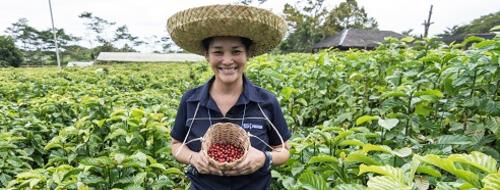In a recent Sustainable Agriculture Forum sponsored by the European Chamber of Commerce themed “Towards a Sustainable and Responsible Agricultural Supply Chain,” Nestlé Philippines Chairman and CEO Kais Marzouki underscored the value of public-private sector partnerships (PPPs) in supporting agriculture because these harmonize public and private resources.
While the government provides infrastructure, access to farmers, and funds, the private sector offers systems, technology, multi-stakeholder links, and a ready market come harvest time, Mr. Marzouki said.
At the same forum, Senator Cynthia A. Villar, chairwoman of the Senate Committee on Agriculture and Food, said: “Increasing food production and farm productivity alone cannot move farmers permanently out of poverty. We must also teach small farmers capacity-building strategies and approaches to get them to operate their small farms as agri-businesses and to make them more profitable and competitive. Through further training and education, farmers are learning new methods of doing things as well as the use of new equipment to help them. In the process, these measures are making agriculture sustainable.”
In pursuit of sustainability, Nestlé is actively committed to two agricultural PPPs, namely the NESCAFÉ Plan which assists Robusta coffee farmers, and supporting sugar farmers through the Responsible Sourcing from Smallholders (RSS) Program.
The NESCAFÉ Plan produces high-quality coffee plantlets, provides farmers with capacity building and technical training by professional agronomists, connects farmers to the market through buying stations, is pilot testing a mobile payment system (GCash) with farmers in Bukidnon, and works with specific coffee communities to increase yield and income.
One initiative of the NESCAFÉ Plan, Project Coffee+, in cooperation with Deutsche Gesellschaft für Internationale Zusammenarbeit (GIZ) GmbH, aims to increase yields and strengthen farmer groups as well create access to loans for 1,500 farmer beneficiaries in Bukidnon and Sultan Kudarat. Project Coffee+ seeks to bring up yields from a baseline of 235 kg. per hectare in 2018 to 1 metric ton per hectare by 2020. Through Project Coffee+, participating farmers have been able to avail of the Production Loan Easy Access (PLEA) facility of the Department of Agriculture’s Agricultural Credit Policy Council.
Under the NESCAFÉ Plan, an average of 10,000 farmers are trained in coffee production every year; the program features strategically located plant nurseries as farmer training centers; Nestlé buys approximately 70 percent of total annual Robusta production in Mindanao where the majority of the country’s Robusta is grown; and to date has distributed more than 16 million high-quality plantlets.
With regard to sugar, Nestlé is a participant in the RSS Program in Negros Occidental, one of the biggest sugar-producing provinces in the country with an estimated 35,000 sugarcane smallholders earning an average monthly income per household of USD 80.
In 2018 Nestlé, the international not-for-profit organization Proforest, the Sugar Industry Foundation, Inc., and participating sugar mills conducted training sessions on cane burning; showcased demonstration farms; established high-yielding nurseries; contributed to the enhancement of livelihood opportunities and financial literacy training; obtained support from the Sugar Regulatory Administration for personal protective equipment (PPE) training, procurement, and distribution; elicited a positive reception from five farming groups on the PPE used; obtained 340 sets of PPE procured for the Lopez mill to distribute; educated 864 farmers on child labor and child rights, and posted related information materials in 29 sugar institutions.
“The goals of PPPs in agriculture are to elevate farmers from subsistence farming to agripreneurship, increase farmer incomes through better yields, and make farming profitable to inspire future generations of farmers, Mr. Marzouki said, “Nestlé is committed to helping coffee and sugar farmers sustainably improve the quality and quantity of their yields. The positive impact on their livelihood helps us realize our purpose at Nestlé to enhance the quality of life of Filipinos and contribute to a healthier future.”

